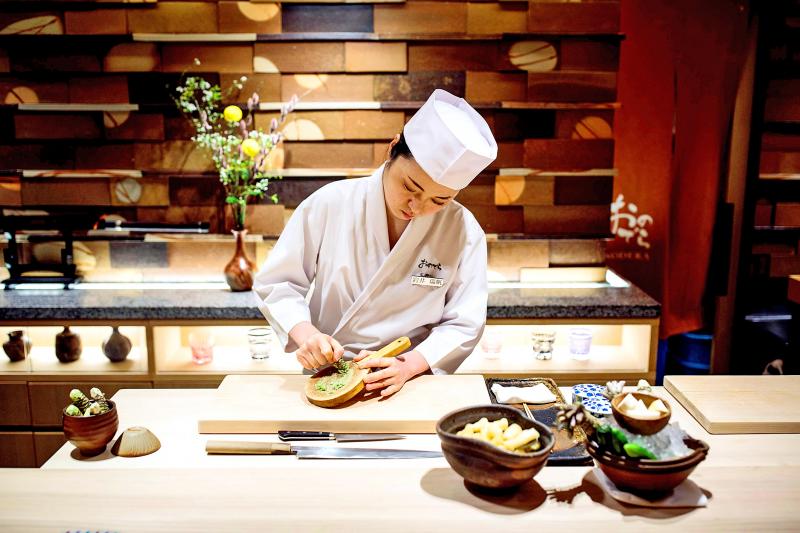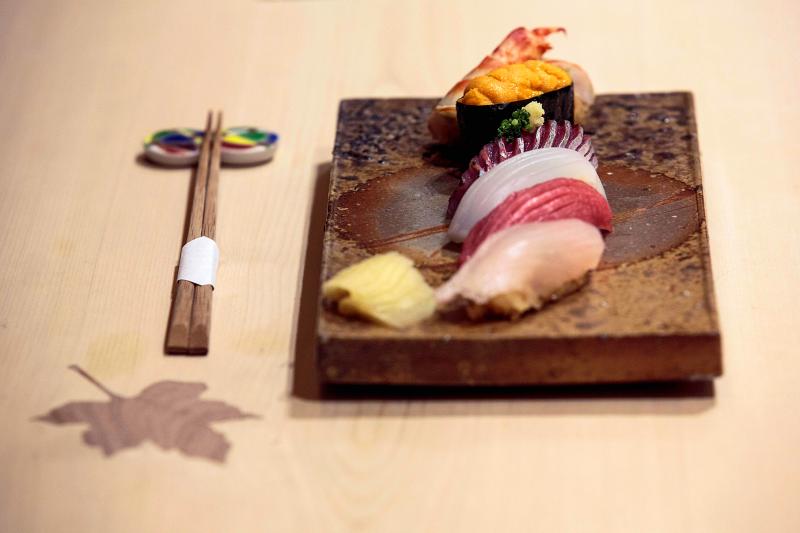Women have warm hands, their periods alter their sense of taste and they can’t work long hours — just some of the claims from those in Japan who believe women can’t be sushi chefs.
But a growing number of women in the country determined to shatter those myths are training and working as sushi chefs in some of Japan’s most revered restaurants and institutions.
Mizuho Iwai is a trainee at the upscale Onodera restaurant in Tokyo’s Ginza, a ritzy neighborhood home to some of the world’s top-ranked sushi restaurants.

Photo: AFP
In an industry where women are still rarely seen, she knew she would be an anomaly.
“I think there are a few [female] chefs but it’s rare. But I wanted to challenge things because of that,” the 33-year-old apprentice said. “I thought: this is my mission.”
And at Onodera, she’s not totally alone, there was one other woman among the 10 apprentices training at the restaurant before it recently closed temporarily over the COVID-19 outbreak. All 10 of the restaurant’s chefs are men.

Photo: AFP
The work can be grueling and requires years to master. Apprentices must learn everything from the names of different types of fish to removing scales and slicing properly. They are even instructed on how to correctly enter through the traditional drapes inside Onodera, by lifting and parting them with an elbow.
“My colleagues have accepted me,” said Iwai, who decided to become a sushi chef after cooking in small Japanese restaurants.
“They don’t treat me specially just because I’m a woman,” she added, after learning how to slice Japanese horse mackerel. “They teach me as a person.”
‘STRONG RESISTANCE’ TO WOMEN
The world of washoku, or Japanese cuisine, has long been dominated by men, more so than Italian or French cuisine, according to Fumimasa Murakami, a 54-year-old teacher at Tokyo Sushi Academy, which was still running a scaled back schedule of classes earlier this month.
There is no official data on the gender breakdown of sushi chefs in Japan, but Murakami estimates women make up “less than 10 percent.”
“[Resistance] against female chefs remains strong in Japanese cuisine, including sushi,” he said.
“Customers who don’t want a female chef at the counter do exist,” he added. “Older customers in particular have difficulty accepting it.”
But even sushi chefs have been known to repeat claims that women’s hands are too warm to keep raw fish fresh, or that their periods alter their sense of taste. Others say the job is unsuitable for women because of the long and late hours.
“In Japan, it is still strongly believed that it is women who take care of family. But sushi chefs work in the evening so it’s difficult for women,” said Yuki Noguchi, a 32-year-old former primary school teacher who finished her eight-month sushi chef training at the academy in December.
“That’s why I think the number of women who want to become a sushi chef is small in the first place,” she said.
PUNISHING TRAINING
Onodera’s head chef Akifumi Sakagami said the sushi world’s reputation for punishing training drove away women but also young people of both genders.
“I think women need a lot of courage to jump in,” the 46-year-old said.
Sakagami started as an apprentice more than 30 years ago in the northern city of Sapporo, when female chefs and trainees were essentially nonexistent.
“When I joined the industry, the working conditions in the washoku world were tough,” he said, as he showed Iwai how to thinly slice tuna and taught her how to properly peel freshly steamed shrimp. “It was long working hours with low pay. It was physically tough.”
“But the work environment is changing along with other changes in society. I think it’s getting better for both men and women,” he added.
He welcomes those changes and says being a chef depends not on gender but “competence, talent and how much effort people put in.” Fuka Sano, the other female apprentice at Onodera, said she didn’t think too much about the lack of women in the field when she decided to become a sushi chef.
“I guess women think a sushi chef is a man’s job because there are so few women,” the 18-year-old said.
But she was determined to enter the profession, after a formative trip to London.“I’m sorry to say this but sushi at chain restaurants in Britain didn’t seem appealing!” she laughed. She hopes to improve the standards of Japanese food overseas.
And Sano wants her food to be judged on its own merits, without regard for her gender.
“I want them to come (to the restaurant) for food,” she said, not “because I’m a woman.”
Her fellow apprentice Iwai hopes women like her are helping change the industry.
“It doesn’t matter whether the chef is a man or woman,” she said. “I hope the fixed image will disappear and there will be more options for women. It’s really a fun job.”

Taiwan has next to no political engagement in Myanmar, either with the ruling military junta nor the dozens of armed groups who’ve in the last five years taken over around two-thirds of the nation’s territory in a sprawling, patchwork civil war. But early last month, the leader of one relatively minor Burmese revolutionary faction, General Nerdah Bomya, who is also an alleged war criminal, made a low key visit to Taipei, where he met with a member of President William Lai’s (賴清德) staff, a retired Taiwanese military official and several academics. “I feel like Taiwan is a good example of

March 2 to March 8 Gunfire rang out along the shore of the frontline island of Lieyu (烈嶼) on a foggy afternoon on March 7, 1987. By the time it was over, about 20 unarmed Vietnamese refugees — men, women, elderly and children — were dead. They were hastily buried, followed by decades of silence. Months later, opposition politicians and journalists tried to uncover what had happened, but conflicting accounts only deepened the confusion. One version suggested that government troops had mistakenly killed their own operatives attempting to return home from Vietnam. The military maintained that the

Jacques Poissant’s suffering stopped the day he asked his daughter if it would be “cowardly to ask to be helped to die.” The retired Canadian insurance adviser was 93, and “was wasting away” after a long battle with prostate cancer. “He no longer had any zest for life,” Josee Poissant said. Last year her mother made the same choice at 96 when she realized she would not be getting out of hospital. She died surrounded by her children and their partners listening to the music she loved. “She was at peace. She sang until she went to sleep.” Josee Poissant remembers it as a beautiful

Before the last section of the round-the-island railway was electrified, one old blue train still chugged back and forth between Pingtung County’s Fangliao (枋寮) and Taitung (台東) stations once a day. It was so slow, was so hot (it had no air conditioning) and covered such a short distance, that the low fare still failed to attract many riders. This relic of the past was finally retired when the South Link Line was fully electrified on Dec. 23, 2020. A wave of nostalgia surrounded the termination of the Ordinary Train service, as these train carriages had been in use for decades